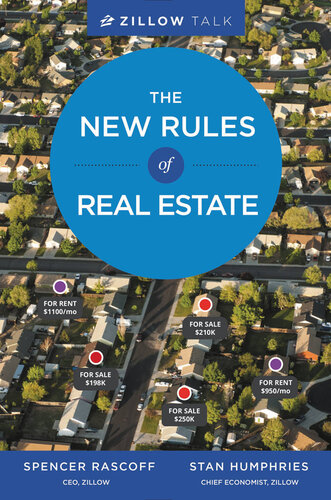
Zillow Talk
Rewriting the Rules of Real Estate
کتاب های مرتبط
- اطلاعات
- نقد و بررسی
- دیدگاه کاربران
نقد و بررسی

February 2, 2015
With an iconoclastic ebullience reminiscent of Freakonomics, Rascoff and Humphries, respectively CEO and chief economist of Zillow.com, exploit the online giant's massive database and sophisticated analytics to debunk conventional real estate wisdom. According to them, no, you shouldn't buy the worst house in the best neighborhood ("It's the worst house for a reason"), but you might want to buy the worst house in the hottest neighborhood, if your timing is impeccable (and these clever guys tell you how to predict the hot spots). To afford a good school district, look in the modest neighborhood bordering the affluent one. And beware: foreclosures are often not the bargains they once were. Another piece of advice from Rascoff and Humphries: avoid "unique" as an ad description like the plagueâyour beloved abode may "sell for as much as 30 to 50 percent less than expected!" This entertaining, quick read is not so much a how-to guide as a grab bag of surprising but useful real estate facts. It won't lead you step by step through the process of buying or selling a home, but its intelligent and clever analysis of various facets of the market will challenge and enlighten both professionals and those of us who just need a place to live.

November 15, 2014
How-to advice on the new paradigms of real estate.When the 2008 housing bubble popped, the dynamics of buying, selling and renting shifted significantly. Rascoff, CEO of Zillow, the "largest real estate site on the Web," with 90 million visitors a month, and its chief economist, Humphries, pull together exhaustive data obtained from constantly updated algorithms and crunch these figures to give readers a definitive guide to real estate in the 21st century. They discuss the pros and cons of buying versus renting, having a fixed-rate mortgage over an adjustable-rate mortgage, and whether that kitchen remodel or man cave are really the best investments of your time and money. Want to know the best time of year to list a home, what a street name means in terms of housing prices, and how to spot the next neighborhood where houses will appreciate in value? These are just some of the numerous questions the authors address using the information they've compiled from their database of more than 100 million listings on Zillow. They analyze the superstitions surrounding numbers in a home's price, "decode" the words used in a listing to describe a house, debunk long-held real estate myths (e.g., always buy the worst home in the best neighborhood), consider the advantages and disadvantages of buying a foreclosure, and even look at the effect a nearby Starbucks has on housing prices. Informative and entertaining, their advice is filled with concrete figures enhanced by graphs and charts that help readers absorb their counsel in small, easy-to-manage bites. A collection of straightforward, easily assimilated facts and figures on the real estate business-a must-read for readers interested in buying, selling or renting a home.
COPYRIGHT(2014) Kirkus Reviews, ALL RIGHTS RESERVED.

Starred review from December 1, 2014
This title seeks to arm home buyers, sellers, and owners with the relevant data to navigate today's postrecession housing market. Coauthored by Rascoff and Humphries, the CEO and chief economist of Zillow (zillow.com), respectively, the book tackles common myths (that remodeling a kitchen gives the best bang for your buck), niche trends (Manhattan real estate prices), and other topics (what your street name says about its value). It turns (mostly) Zillow statistics into interesting and relevant housing topics. While much of the coverage is very specific, the conclusion focuses on more general information and sometimes verges on editorializing. One example is the popular mortgage interest deduction (MID). Rascoff and Humphries state that it doesn't affect most people, only those who pay federal income taxes, itemize their deductions, and currently have a mortgage (about 13 percent of people). They recommend replacing it with a first-time home buyer tax credit or cash grant; they say that this would help less affluent buyers and wouldn't need to be subsidized by Washington, as the MID is. Extensively backed up by data and well sourced, this book is written in a fast-paced, conversational manner and is easy to read. VERDICT Recommended for those interested in statistics and the housing market, or real-estate watchers seeking new ways to look at housing.--Leigh Mihlrad, FDIC Lib., Washington, DC
Copyright 2014 Library Journal, LLC Used with permission.

February 1, 2015
Zillow executives Rascoff and Humphries set out to explain the new rules of real estate to help in home purchases and sales. Their goals are to use Zillow data to rethink how you buy, sell, finance, and live in your home; to show how and how much the rules of real estate have changed; and to educate on old myths such as, Is home ownership really an integral part of the American dream? Real-estate decisions are complicated, and they differ from other investments due to the emotional elements (e.g., family situations, emotional attachments, and cultural expectations). Zillow was founded in 2006 with the power to estimateor . . . Zestimate the value of nearly every home in America. It is the largest real-estate site on the Web and on mobile, with 90 million people (unique users) monthly. Although this book is clearly advertising for Zillow, it contains valuable information for many library patrons to empower them as buyers and sellers in complex real-estate decisions.(Reprinted with permission of Booklist, copyright 2015, American Library Association.)

























دیدگاه کاربران